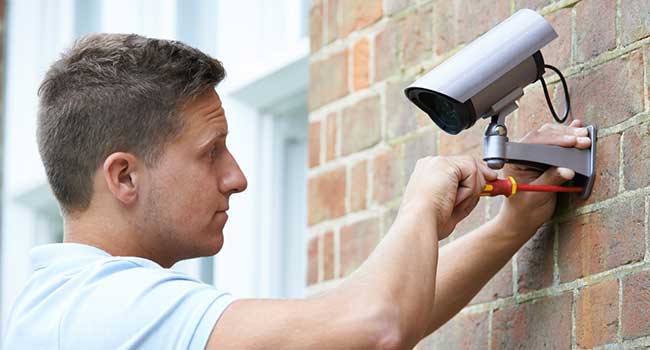
Questions to Ask Your Commercial Security Provider
- By Jeff Wyatt
- Apr 20, 2017
The primary function of a commercial security system is to provide a safe and secure business environment, so everyone can sleep a little easier knowing the business is protected. Not only are you getting the benefit of protection from unlawful entry and theft, but it helps foster a safe and productive work environment for employees and guests.
Thieves are always on the prowl for their next opportunity, and a business offers plenty. This is why businesses should protect and secure not just the property, but the data, resources and especially employees. Beyond what you might think of as a typical criminals, a business is also at risk of fraud, embezzlement, arson and other white-collar crimes.
Not all crimes can be prevented, but with the utilization of common commercial security devices like access controls, video surveillance, and emergency communications, they can be deterred. Commercial security devices are reliable resources should you need any criminal investigations.
So it’s clear that security services are imperative to a business, but before you decide which professional security provider you should choose, let’s think about what questions you need to be asking before making the decision.
How many years of experience does your company have in commercial security?
This may seem like an unnecessary question, but it’s quite the opposite. You would much rather have a doctor with lots of experience do your surgery rather than someone who’s still in medical school, right? There should be no difference when thinking about your security providers. You want someone with extensive experience in designing, building and maintaining commercial security systems. It’s also always a good idea to choose a company with experience in fire and life safety, as you may want your safety and security systems to integrate.
Are you and your technicians licensed, certified & trained?
This is a basic, but valuable question. Reputable security companies will be more than happy to tell you about their well-trained technicians and employees, and to let you know what certificates and licenses they hold. ESA, NICET, and manufacturer certifications are just a few common elements to look for. Another tip is to see if they have any complaints or incidents with the Better Business Bureau.
Have you worked with businesses similar to mine? Can I contact them?
It’s always good when a service provider has experience in a specific industry or business relatable to yours. Each business is different and understanding the industry that you’re in is vital in order to develop a system that will meet your specific needs. Never be afraid to ask for case studies and references.
Which brands of security equipment does your company use for your clients?
Reputable commercial security businesses will generally be certified distributors of some of the leading security and life safety brands available. It’s a good idea to consider the businesses that use equipment and services from the more well-known security brands, as they will likely provide you with a higher level of support and service due to more stringent requirements and training from the brands.
Do you provide fully-integrated systems?
Even if you’re thinking you only need one specific type of intrusion detection system at the moment, you still want to choose a commercial security company that can provide all life safety and security needs, because you never know what your business may need in the future. This ensures that your provider will be familiar with integrating any existing systems with new ones. You want a company that can design, install and maintain access control systems, video surveillance, intrusion detection systems, emergency communication systems and fire protection systems.
What monitoring solutions do you offer?
Most commercial security companies work with a partnering professional monitoring company that monitors the fire and security systems of the business. This monitoring company should provide 24/7/365 monitoring of your system. They should also have redundant backup solutions, like multiple monitoring centers and generators, to handle natural disasters, power failures and human error.
Do you provide 24/7 support?
You never known when a thief will strike. What happens if your company needs to quickly address an issue with the security system? It’s important to make sure your security provider offers 24/7 support. They need to be easily accessible in a timely manner. The more established commercial security companies should be able to provide support at any time of any day.
Are your technicians knowledgeable of the NFPA codes and standards?
The National Fire Protection Association (NFPA) develops and publishes more than 300 codes and standards with the intention to minimize the possibility and effects of fire and other risks. While compliance with NFPA standards is voluntary, in many cases they shape local and state mandates. Even though NFPA standards don’t directly deal with commercial security, they are important to know when integrating commercial security systems with life safety systems, so having technicians knowledgeable in NFPA codes and standards is a huge asset to your company.
It’s clear that you need a professional security provider for your business, and there are many commercial security providers that can help your business. It’s important that you choose the right one, and not just the one for right now - but for the long-term outlook of your business. Make sure whoever you choose can answer all of these questions and give you the peace of mind you need when making a potentially life-saving decision.